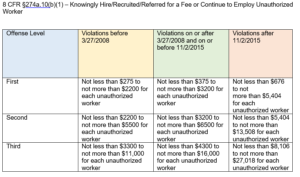The Department of Homeland Security (DHS) extended the COVID-19 remote completion flexibilities for Form I-9 effective November 1, 2022, until July 31, 2023. On May 5, 2023, U.S. Immigration and Customs Enforcement (ICE) announced that employers will have 30 days to reach compliance with Form I-9 requirements after the COVID-19 remote inspection flexibilities end on July 31, 2023. This announcement means that employers have until August 30, 2023, to perform the required physical examination of identity and eligibility documents for those hired on or after March 20, 2020, whose documents were reviewed via a virtual or remote examination. Please refer to my prior blog regarding the guidance DHS provided on how to annotate the Form I-9 when conducting this type of in-person review.
Keep in mind that the new one-page Form I-9 is expected to be implemented in 2023, along with a potential new option to verify documentation remotely in limited circumstances (e.g., E-Verify enrolled employer, limited remote visual options, etc.).
With the possibility of a new Form I-9 and a limited remote inspection option in the future for E-Verify employers in 2023, should employers still go through the trouble of verifying those Forms I-9 completed using remote verification?
Bluntly, yes. DHS has signaled in meetings with the liaison committee for the American Immigration Lawyers Association (AILA) as well as at a recent AILA conference that ICE will not suspend its enforcement actions related to I-9 Forms completed using the remote inspection flexibility policy followed on or after March 20, 2020, during the pandemic. ICE has provided an extra month post the end of the option to use remote verification for employers to get their collective acts together.
What if an employer decides not to proceed with verifying the identity and employment authorization documents of employees for whom remote inspection of their Form I-9 was completed?
What if ICE decides that a remote inspection is basically no inspection of qualifying documents for the Form I-9? Does this mean a substantive violation even though the employer did review the documents to determine identity and work eligibility via a government-issued flexibility policy?
For some history, in U.S. v. Seven Elephants Distributing Corp., 10 OCAHO 1173 (March 18, 2013), the Administrative Law Judge (ALJ) found that even though the employer had copied the supporting documents for Form I-9 verification, this was not a satisfactory substitute for properly completing Section 2 of the Form I-9. 8 CFR §274a.2(b)(3). In addition, the failure to complete the section 2 attestation, in this case, was a substantive violation. In yet another OCAHO case in 2016, a “[F]ailure to review and verify a proper List A or Lists B and C document(s) in section 2” of the Form I-9 is a substantive paperwork violation. United States v. Frimmel Mgmt., LLC, 12 OCAHO no. 1271c, 16 (2016) (citing Virtue Memorandum 3–4).
In the remote inspection scenario, though, the employers’ only variance from the standard Form I-9 process was tied to a government-based remote verification policy and not a failure to complete Section 2. Employers did review the documents (remotely) and completed Section 2. The temporary policy of remote verification is opening the door to penalties. It would be more reasonable to allow those subject to an inspection notice for Forms I-9 in the future to be given a grace period to conduct in-person inspections of Forms I-9 completed using the temporary COVID-19 flexibility policy or to exempt those Forms I-9 completed during this time frame from a penalty for failure to verify documents in-person. In addition, the failure to do so must not be categorized as a substantive violation. However, it does not appear that ICE will take this approach. Calls to congressional representatives are in order by concerned employers regarding this issue.
The current Form I-9 civil penalties for paperwork and knowing hire (continue to employ) violations are as follows:


Conclusion
How does this approach treat the failure to complete an in-person inspection of the Form I-9 related identity and employment documents as substantive based on ICE’s arbitrary deadlines for in-person inspection? In addition, why take such a draconian approach when DHS intends to allow the option in the near future for remote verification of Forms I-9 in limited circumstances for E-Verify employers? Makes little pragmatic/reasonable sense.
What to do? Employers should consult legal counsel as they make risk assessments regarding compliance with the new ICE deadline for remote verification corrections (in-person review) of Form I-9 documents. As to those employers who have been using the limited remote verification option announced as of March 20, 2020 —- make sure to end any remote verification of the documents for Form I-9 completion on or before July 31, 2023. Finally, keep checking for the new Form I-9 announcement and a possible remote inspection option on a limited basis.
Related Services:
About the Author:
 Kathleen Campbell Walker is chair of the Immigration Practice Group, based in El Paso, Texas. She is a past president (2007) and general counsel (2009) of the American Immigration Lawyers Association (AILA). She began practicing immigration law in 1986. In 2014, Ms. Walker received the AILA Founder’s Award, given occasionally to the person or entity having the most substantial impact on immigration law or policy. She is board certified in Immigration and Nationality Law by the Texas Board of Legal Specialization. In addition, she is recognized in Chambers USA (Band One), Chambers Global (Band One), International Who’s Who of Business Lawyers, Super Lawyers, and Best Lawyers in America. She is rated AV® Preeminent™ in Martindale-Hubbell®. She can be reached at 915-541-9360 or kwalker@dickinsonwright.com, and her biography can be accessed here.
Kathleen Campbell Walker is chair of the Immigration Practice Group, based in El Paso, Texas. She is a past president (2007) and general counsel (2009) of the American Immigration Lawyers Association (AILA). She began practicing immigration law in 1986. In 2014, Ms. Walker received the AILA Founder’s Award, given occasionally to the person or entity having the most substantial impact on immigration law or policy. She is board certified in Immigration and Nationality Law by the Texas Board of Legal Specialization. In addition, she is recognized in Chambers USA (Band One), Chambers Global (Band One), International Who’s Who of Business Lawyers, Super Lawyers, and Best Lawyers in America. She is rated AV® Preeminent™ in Martindale-Hubbell®. She can be reached at 915-541-9360 or kwalker@dickinsonwright.com, and her biography can be accessed here.
